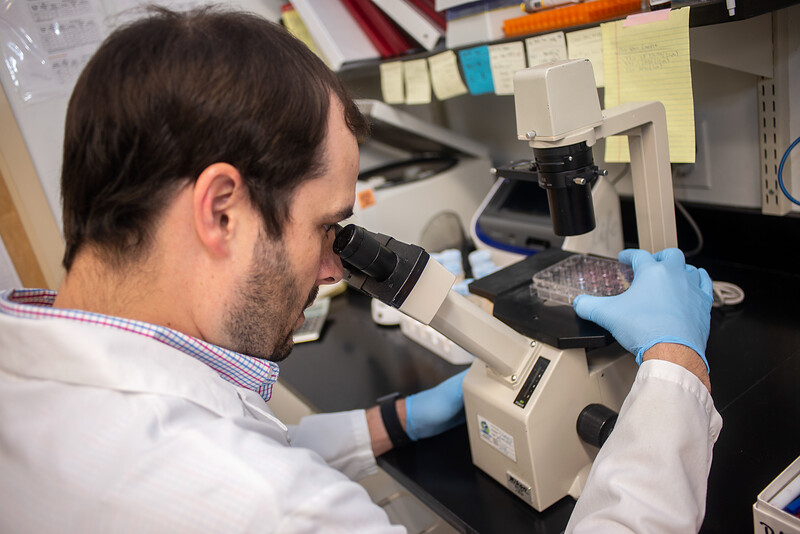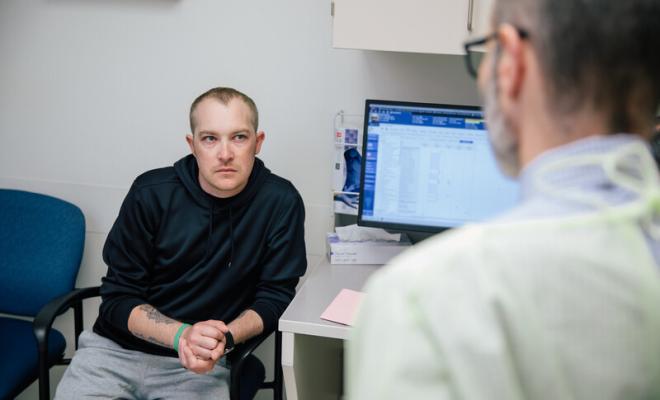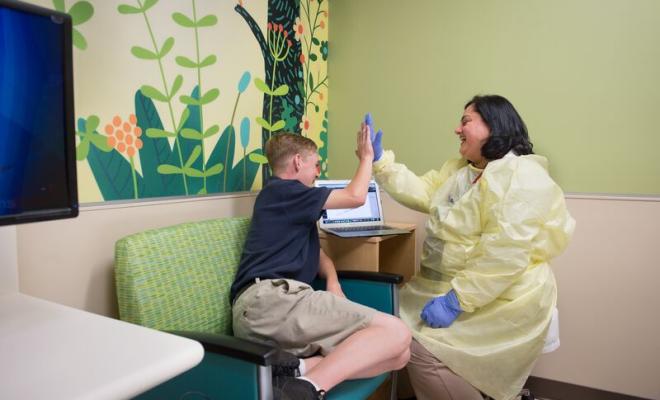About 10% of people with cystic fibrosis in the U.S. have two rare mutations (including nonsense and missense mutations, splicing defects, frameshifts, insertions, and deletions). Of those, it is anticipated that about 4% of these individuals have mutations that may respond to CFTR modulators that correct the cystic fibrosis transmembrane conductance regulator (CFTR) protein.
Through a process called “theratyping,” the Foundation is supporting lab testing to identify the mutations that respond to currently approved CFTR modulators. If any of the tests show positive results, the Foundation will share this with the drug's manufacturer.
Around 6% of people with CF have a combination of two nonsense and rare mutations that do not produce CFTR protein. Because these individuals do not produce CFTR protein, they cannot benefit from available CFTR modulators. Other people with CF may not take modulators because they can’t tolerate the drugs, or they don’t experience much clinical benefit.
The Cystic Fibrosis Foundation is funding many scientific approaches to develop new treatments for this population. These approaches include developing treatments that target specific types of mutations as well as therapies that could work for any mutation. We are also funding the REACH study, an observational study for all people with CF who do not take CFTR modulators, regardless of their reason. Participants in REACH will take part in research visits to collect de-identified health information and specimens — like bloodwork — for analysis. This information will help improve our medical understanding of CF and advance new therapies that are much needed.
Potential Therapies for Nonsense Mutations
Nonsense mutations (also known as “x” or “stop” mutations) result in a premature stop signal in messenger RNA (mRNA). mRNA is essential for protein production, acting as a template that carries the instructions for assembling a protein. The premature stop signal interrupts the instructions, causing the production of the CFTR protein to stop prematurely. This leads to a shortened, non-functional protein that the cell recognizes as defective and destroys.
Work is being done to screen for compounds that could enable the protein-making machinery of the cell to override premature stop signals so that a full-length protein can be made. These compounds would be known as readthrough agents because they could “read through” the premature stop signals.
Nonsense mutations also shorten the amount of time that mRNA lasts in the cell, thereby decreasing the amount of protein that can be made. Therefore, we are also investigating ways to selectively stabilize mRNA so that it does not degrade as fast.
The nonprofit organization Southern Research, in collaboration with the University of Alabama at Birmingham and the CF Foundation, has used a sophisticated screening process to identify compounds in its chemical library that promote readthrough and stabilize mRNA. In addition, the CF Foundation Therapeutics Lab has developed its own screening process and collection of cells with different CF-causing mutations to identify compounds that might be worth developing into drugs. The lab has screened well over 200,000 compounds to identify those that may work on CFTR nonsense mutations and warrant further development.
The lab's scientists also spearheaded an initiative to collect cells from people with CF with diverse nonsense mutations. These cells have been banked at the lab and are critical for screening studies to identify or validate potential new drugs and other treatment options. The cells can be made available to companies and CF scientists to advance research in this area. The Foundation is collecting these cells at the University of Alabama at Birmingham as part of a study called RARE.
mRNA Therapy and Gene Therapy
mRNA therapy is a potential treatment that could work for all people with CF, including those with nonsense and rare mutations. mRNA therapy would deliver a new, correct copy of CFTR mRNA to cells, allowing them to produce healthy CFTR protein. This type of therapy would not affect a person’s own DNA, and the effects would not be permanent, meaning the therapy would need to be re-dosed.
Gene therapy, also called gene transfer, is another approach that could potentially work for any person with CF, regardless of their mutations. Gene therapy involves delivering a new, correct copy of the CFTR gene (DNA) to cells. The cells can use the new copy of the gene to create normal CFTR mRNA and functional CFTR protein.
There are two gene therapy strategies being explored in CF:
- Integrating gene therapy, in which the correct copy of the gene becomes a permanent part of a person’s genome
- Non-integrating gene therapy, in which the correct copy of the gene is delivered to cells but is not permanent and will therefore require re-dosing
Currently, mRNA therapy and gene therapy for CF are being developed as inhaled treatments that will target only the lungs. Both types of therapy are being tested in clinical trials in adults with CF. Visit the Clinical Trial Finder to browse for genetic therapy clinical trials that are currently enrolling.
Antisense Oligonucleotide Therapy
Antisense oligonucleotide (ASO) therapy is being explored to correct the effects of rare mutations, such as splicing mutations, which disrupt the production of mRNA. Because mRNA is necessary to make CFTR proteins, splicing mutations prevent cells from making normal CFTR proteins.
ASOs work by binding to the mRNA molecule and correcting the instructions so that a full-length CFTR protein can be made.
Oligonucleotides, including ASOs, provide a potential therapeutic approach for several types of CFTR mutations and are already used in the treatment of spinal muscular atrophy, certain forms of muscular dystrophy, and other genetic diseases.
We are investing up to $8.5 million in additional funds in SpliSense to support a Phase 2 clinical trial of its inhaled ASO drug for people with CF who have the splicing mutation 3849+10Kb C-to-T. The objective of the clinical trial is to generate a proof-of-concept for using this type of technology to treat people with CF with certain rare mutations.
Gene Editing
Gene editing is a strategy to permanently make a change to the DNA in a cell, which could be used to correct a person’s CFTR mutations. Gene editing strategies can either be targeted to specific mutations or designed to address many mutations with a single approach. A major advantage of gene editing is that, unlike mRNA therapy and non-integrating gene therapy — which are both temporary — gene editing has the potential to provide a permanent therapeutic benefit. People might require only one treatment with a gene editing tool to have a lasting effect on their disease.
However, gene editing technology is still very early in development for CF. Because it makes a permanent change to a person’s DNA, it poses distinct risks and challenges. Although gene editing research is promising, it will be many years before this type of technology can be tested in clinical trials. Explore the Drug Development Pipeline to see the full range of genetic therapies we are pursuing in CF, including preclinical lab studies of gene editing approaches.
***
Reference to any specific product, process, or service does not necessarily constitute or imply its endorsement, recommendation, or favoring by the Cystic Fibrosis Foundation. The appearance of external hyperlinks does not constitute endorsement by the Cystic Fibrosis Foundation of the linked websites, or information, products, or services contained therein.
Information contained on this site does not cover all possible uses, actions, precautions, side effects, or interactions. This site is not intended as a substitute for treatment advice from a medical professional. Consult your doctor before making any changes to your treatment.
FDA-approved drug information is available at dailymed.nlm.nih.gov/dailymed.


